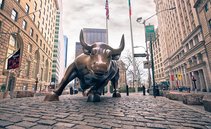The S&P 500 officially entered correction territory last week. Could this actually be the start of a recession?

Markets are officially entering correction territory, as the S&P 500 breaks the resistance level and falls to its lowest performance in 5 months. The Dow Jones and the Nasdaq Composite are also adjusting to liquidity levels, being down 3.04% and 5% respectively this month.
At some point, the market rally was going to stop. Analysts and experts knew this was going to happen, they just were not sure when. Year-to-date, the S&P 500 is still high at 7.67% following last year’s sharp decline.
This rally was mainly driven by artificial intelligence stocks like NVIDIA, Apple, Google, and Microsoft. Already before the summer, most mid-range corporations were struggling and bankruptcy levels reached a new high.
However, markets remained overall positive also because of an exceptionally resilient US economy. Despite high inflation and the Federal Reserve’s hike policy, the American GDP kept growing (even more than China’s) while consumer spending kept the economy afloat.
Meanwhile, the Federal Reserve implemented its strongest tightening policy since the 1980s. In just 18 months, the Fed brought interest rates to 5.5%, signaling at least another hike in 2023.
The hike policy was so powerful that it almost caused a banking crisis in March 2023. It goes without saying that liquidity is extremely low, even though markets seem to ignore it.
Will the S&P 500 rally in 2024?
The latest Fed meeting in September gave markets a reality check. It’s hard to say whether this is the beginning of a recession or just a temporary (and very much needed) correction.
For market investors, it looks like more of the latter. S&P 500 futures jumped 0.70% in Monday trade.
Some analysts believe the S&P 500 will reach new highs in 2024, with JP Morgan CEO Jamie Dimon convinced a soft landing is ahead.
leggi anche
US stocks set to rally in 2024, here’s why

It will all depend on the Fed’s next moves. Chairman Jerome Powell made clear its intentions are to keep interest rates higher for longer. The first cuts should be coming in late 2024/ early 2025 when inflation should finally reach the 2% target.
However, many worry that another hike in 2023 will trigger a recession. Although the American GDP grew more than expected in the last quarter (4.9% compared to 4.7%), it was mostly thanks to summer spending.
Experts agree that GDP growth in the last quarter will be much lower, increasing risks for a 2024 recession. This would have incredibly harmful consequences: a US recession during an election year could have far-reaching impacts on global politics.





